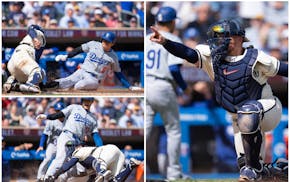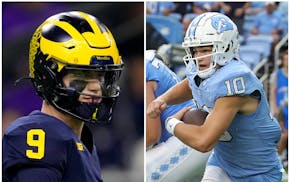In his first game back with the Wild after being recalled from the minors in December, tough guy Matt Kassian fought Edmonton's Darcy Hordichuk twice and pummeled him twice.
Afterward, a group of reporters, myself included, joked with Kassian and shared a laugh about the enforcer's get-on-your-feet motion to the crowd as he skated to the penalty box. Kassian's knockdowns gave his team life and provided a spark in a 3-1 victory.
The banter in the locker room left me conflicted after reflecting on former Wild fighter Derek Boogaard, his death and all the stories that followed it detailing the emotional and physical toll that enforcers experience. The death of Boogaard and two other enforcers last year shined a spotlight on the role of hockey fighters. It was not a pretty picture: Numerous former enforcers revealed how much they suffered and, in some cases, hated their job but accepted that role anyway because it was their only means of playing in the NHL.
Given the sensitive nature of that subject, those lighthearted questions over Kassian's two-round bout against Hordichuk somehow felt inappropriate, or perhaps in poor taste.
"It doesn't bother me," Kassian said Wednesday.
This conversation came the day after Kassian fought Anaheim's George Parros, a veteran enforcer. The website hockeyfights.com, which tracks on-ice bouts, judged the fight a draw based on fan voting.
Kassian knew he'd probably fight Parros that night. The situation practically begged for it. He hadn't dropped his gloves in a while, Parros is considered a heavyweight, and the Wild badly needed something, or someone, to breathe life into the free-falling team.
"I was pretty sure there was a high possibility of it happening," Kassian said. "You never know. It always depends on the game. But you get the nerves. I try and prepare for it. But I don't dwell on it. I'm sure some guys maybe do. I think about it a little bit. I think if you don't get some nerves, something's probably wrong with you. Like something seriously wrong with you."
But what about the potential consequences, the occupational hazards? A study of Boogaard's brain posthumously revealed that he suffered from chronic traumatic encephalopathy (CTE), a degenerative brain disease caused by repeated brain trauma. Boogaard died of an accidental overdose of alcohol and oxycodone after struggling with addiction. But he and a few other former enforcers were found, after their deaths, to have CTE.
Hockey enforcers can fill an arena with emotion and get fans on their feet by engaging in a bare-knuckle fight. But at what cost? It's a delicate topic that has no right or wrong answers. It's not like asking about a struggling power play or an effective forecheck.
Agree or disagree with the fundamental need for fighting in hockey, it's a part of the game that isn't going away. Too many fans enjoy it, and for whatever reason, teams usually respond with more energy after a fight. Kassian certainly has had that effect on his team.
Kassian was refreshingly candid in discussing his role and the professional satisfaction he gains from it. He said he thinks about Boogaard at times but doesn't dwell on the possible consequences.
"I think anyone who is in the role that I am is going to occasionally think about it," Kassian said. "It's not like it's something that's not there."
Kassian sounds like a guy who loves his job, though. He compared the nerves to riding a roller coaster. He hates heights but loves roller coasters.
"Fighting in hockey, for me, there's just something about stepping into something that makes you nervous and something that is going to challenge you and scares you a little bit and just kind of going face first," he said.
A number of former enforcers described being almost paralyzed by those fears. They couldn't sleep well, had trouble eating and lived in a state of constant anxiety while waiting for their next fight. They portrayed it as a miserable existence that just consumed them.
"I don't think it is at all," Kassian said. "It can be difficult. [But] if you're an oil worker and something is happening, or working for a company that's in danger of going bankrupt, that's going to weigh on you pretty heavily, too. All the layoffs in the economy, it's a different type of hard, but it's going to be just as hard on you emotionally. It's different type of pressure, but it's how you deal with it. Maybe some people don't deal with it as well. I know for me personally I have ways that I do and my own things. My faith is what I lean heavily on, and my family and my friends."
Chip Scoggins • ascoggins@startribune.com

Scoggins: Finch feeling heat of the Suns as playoff battle looms
Scoggins: Why 'championship or bust' fits these Wolves

Scoggins: Anatomy of a game-saving play as Correa throws out Ohtani


